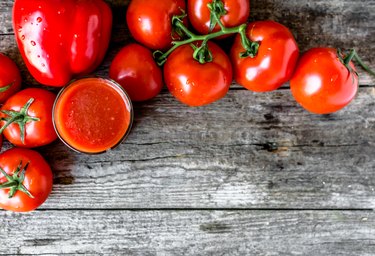
Invented in 1933 in Evanston, Illinois, V8 juice contains the same eight vegetables in 2018 as it did then — carrots, celery, beets, lettuce, parsley, spinach, tomatoes and watercress. Campbell's produces 20 varieties of V8, including high fiber, low sodium and varieties containing fruit as well as vegetables. Check serving sizes carefully when shopping for the juice — Campbell's lists nutritional values for 8 oz. servings, while the bottles and cans come in different size containers, ranging from 5.5 oz, to 12 oz to 64 oz.
Tip
V8 juice is good for you and can help you meet your daily veggie needs. But make it the low-sodium version for better nutrition and health.
Video of the Day
Nutrition in Original V8
Original V8 juice contains 51 calories for an 8 ounces serving, along with 2 grams of protein, 10 grams of carbohydrates, 2 grams of fiber and 8 grams of sugar. It also contains 4 percent of your daily recommended calcium, with 39 mg; 4 percent of the daily recommended iron, with .7 milligrams; and 470 milligrams of potassium, or 23 percent of the recommended amount.
Video of the Day
The juice is high in vitamins A and C, with 72 milligrams of vitamin C, for 120 percent of the daily recommended amount and 2000 units of vitamin A, for 30 percent of the daily recommended amount. Low sodium V8 contains more potassium than Original V8, with 820 milligrams or 41 percent of the daily recommended amount.
Sodium in Original V8
With 480 milligrams of sodium in one 8 ounce glass, Original V8 contains 20 percent of the daily recommended amount of sodium that the US Department of Health and Human Services recommends for a healthy diet to keep your blood pressure at normal levels. Low sodium V8 juice is a better choice. With 120 milligrams of sodium, it contains six percent of the daily recommended amount. Most Americans consume way more sodium than they need, according to the Centers for Disease Control and Prevention, and should choose foods lower in sodium, like low-sodium V8 juice, to reduce overall intake.
Importance of Vegetables
V8 juice contains two serving of vegetables in an 8 ounce glass, giving you a boost toward getting the recommended five daily servings that reduce your risk of heart disease and stroke. Harvard Medical School reports a 30 percent difference in the risk of heart disease for those eating more fruits and vegetables. While a little-reported 2001 Harvard study of a diet high in fruits and vegetables showed low effects on cancer rates, the study did find that each 7 ounce change in the amount of fruits and vegetables you eat lessens your cancer risk by 4 percent.
Juice vs. Whole Vegetables
Katherine Zerasky, a registered dietitian at the Mayo Clinic, advises that you should not routinely get your vegetable servings from juice because whole vegetables contain more fiber than juice. However, drinking vegetable juice like V8 makes it more likely that you will meet the recommended servings of vegetables and can help lower your blood pressure according to a study by the University of California, Davis, reported in 2010 in the "Nutrition Journal."
- V8 Juice: FAQS: V8 100% Vegetable Juice
- US Department of Agriculture: Nutrient Data Laboratory
- University of Maryland Medical Center: Potassium
- US Department of Health and Human Services: DASH Eating Plan
- Harvard Medical School: War on Cancer Won't Be Won in the Produce Aisle
- “The Use of a Commercial Vegetable Juice. . .”; Shenoy et al; “Nutrition Journal”; 2010